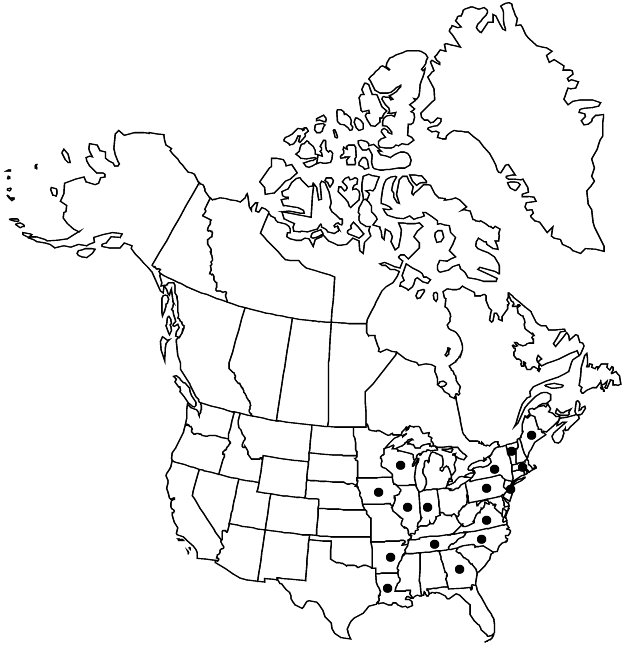Difference between revisions of "Hylotelephium erythrostictum"
Bot. Mag. (Tokyo) 90: 50. 1977 ,.
FNA>Volume Importer |
imported>Volume Importer |
||
| (3 intermediate revisions by 2 users not shown) | |||
| Line 10: | Line 10: | ||
|name=Sedum erythrostictum | |name=Sedum erythrostictum | ||
|authority=Miquel | |authority=Miquel | ||
| + | |rank=species | ||
|publication_title=Ann. Mus. Bot. Lugduno-Batavi | |publication_title=Ann. Mus. Bot. Lugduno-Batavi | ||
|publication_place=2: 155. 1855 | |publication_place=2: 155. 1855 | ||
| Line 16: | Line 17: | ||
|name=Sedum alboroseum | |name=Sedum alboroseum | ||
|authority=Baker | |authority=Baker | ||
| + | |rank=species | ||
}} | }} | ||
|hierarchy=Crassulaceae;Hylotelephium;Hylotelephium erythrostictum | |hierarchy=Crassulaceae;Hylotelephium;Hylotelephium erythrostictum | ||
| Line 31: | Line 33: | ||
|elevation=400-1800 m | |elevation=400-1800 m | ||
|distribution=Ark.;Ga.;Ill.;Ind.;Iowa;La.;Maine;Mass.;N.J.;N.Y.;N.C.;Pa.;Tenn.;Vt.;Va.;Wis.;Europe (Russia);e Asia. | |distribution=Ark.;Ga.;Ill.;Ind.;Iowa;La.;Maine;Mass.;N.J.;N.Y.;N.C.;Pa.;Tenn.;Vt.;Va.;Wis.;Europe (Russia);e Asia. | ||
| + | |introduced=true | ||
|discussion=<p>Plants of <i>Hylotelephium erythrostictum</i> growing in North America as garden escapes seem to be, at least in part, sterile hybrids. R. T. Clausen wrote (1949) that this species is, or (1975) may be, a hybrid of <i>Sedum</i> spectabile A. Boreau and S. viridescens T. Nakai (S. taqueti R. L. Praeger). However, <i>H. erythrostictum</i> has been found in northern Japan with normal flowers, and most descriptions do not mention them as defective (H. Ohba, pers. comm.). Some plants wild in North America clearly have defective flowers; others seem not to.</p><!-- | |discussion=<p>Plants of <i>Hylotelephium erythrostictum</i> growing in North America as garden escapes seem to be, at least in part, sterile hybrids. R. T. Clausen wrote (1949) that this species is, or (1975) may be, a hybrid of <i>Sedum</i> spectabile A. Boreau and S. viridescens T. Nakai (S. taqueti R. L. Praeger). However, <i>H. erythrostictum</i> has been found in northern Japan with normal flowers, and most descriptions do not mention them as defective (H. Ohba, pers. comm.). Some plants wild in North America clearly have defective flowers; others seem not to.</p><!-- | ||
--><p>A. E. Radford et al. (1968) called members of this species <i>Sedum</i> spectabile A. Boreau, which is a native of China and Korea and often grown in gardens but not known to escape. <i>Sedum</i> spectabile is similar but may be recognized by its relatively small, pink flowers with conspicuously exserted stamens (R. V. Moran 1964).</p> | --><p>A. E. Radford et al. (1968) called members of this species <i>Sedum</i> spectabile A. Boreau, which is a native of China and Korea and often grown in gardens but not known to escape. <i>Sedum</i> spectabile is similar but may be recognized by its relatively small, pink flowers with conspicuously exserted stamens (R. V. Moran 1964).</p> | ||
| Line 41: | Line 44: | ||
-->{{#Taxon: | -->{{#Taxon: | ||
name=Hylotelephium erythrostictum | name=Hylotelephium erythrostictum | ||
| − | |||
|authority=(Miquel) H. Ohba | |authority=(Miquel) H. Ohba | ||
|rank=species | |rank=species | ||
| Line 57: | Line 59: | ||
|publication year= | |publication year= | ||
|special status= | |special status= | ||
| − | |source xml=https:// | + | |source xml=https://bitbucket.org/aafc-mbb/fna-data-curation/src/2e0870ddd59836b60bcf96646a41e87ea5a5943a/coarse_grained_fna_xml/V8/V8_328.xml |
|genus=Hylotelephium | |genus=Hylotelephium | ||
|species=Hylotelephium erythrostictum | |species=Hylotelephium erythrostictum | ||
Latest revision as of 23:42, 5 November 2020
Stems 4–10 dm × 5–10 mm, from rootstock with cluster of white, tuberous, carrot-shaped roots. Leaves alternate or opposite, sessile or short-petiolate, becoming scarcely smaller distally; blade light yellow-green or glaucous-green, elliptic, 6–10 × 3–4 cm, base rounded or cuneate, margins coarsely serrate or dentate toward apex, apex subacute. Cymes lax, 7–15 cm diam. Pedicels 3–6 mm. Flowers often sterile, 8–10 mm diam.; sepals triangular, 2 mm; petals white with green midribs or greenish, 5–6 mm; stamens absent or 1–10, as long as petals; pistils absent or 1–5, pink, 3–5 mm; styles 1 mm; nectaries whitish, oblong, 1 mm, longer than wide. 2n = 48.
Phenology: Flowering late summer–fall.
Habitat: Trash heaps, disturbed places
Elevation: 400-1800 m
Distribution

Introduced; Ark., Ga., Ill., Ind., Iowa, La., Maine, Mass., N.J., N.Y., N.C., Pa., Tenn., Vt., Va., Wis., Europe (Russia), e Asia.
Discussion
Plants of Hylotelephium erythrostictum growing in North America as garden escapes seem to be, at least in part, sterile hybrids. R. T. Clausen wrote (1949) that this species is, or (1975) may be, a hybrid of Sedum spectabile A. Boreau and S. viridescens T. Nakai (S. taqueti R. L. Praeger). However, H. erythrostictum has been found in northern Japan with normal flowers, and most descriptions do not mention them as defective (H. Ohba, pers. comm.). Some plants wild in North America clearly have defective flowers; others seem not to.
A. E. Radford et al. (1968) called members of this species Sedum spectabile A. Boreau, which is a native of China and Korea and often grown in gardens but not known to escape. Sedum spectabile is similar but may be recognized by its relatively small, pink flowers with conspicuously exserted stamens (R. V. Moran 1964).
Selected References
None.